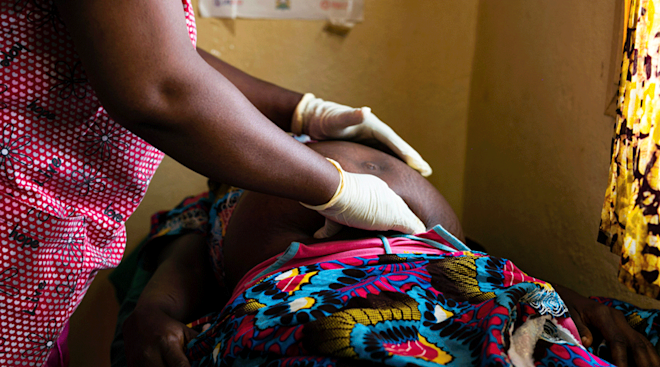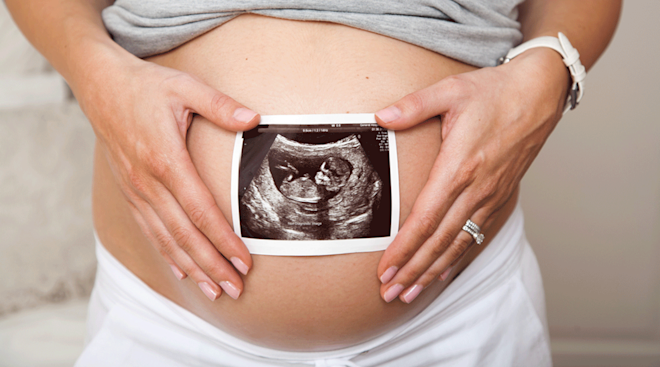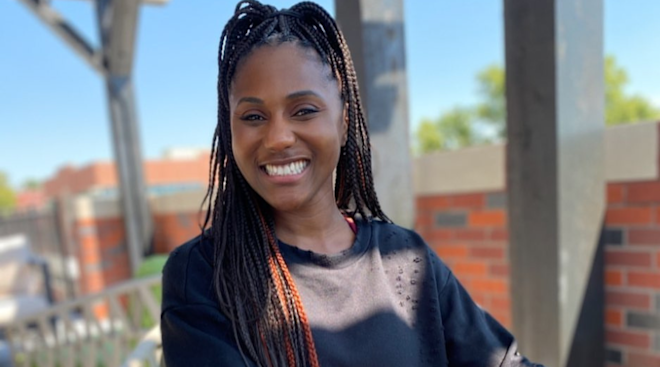What Black Birthing People Should Know About Possible Medicaid Cuts
When Kim Jefferson learned she was pregnant in early 2024, she was also a part-time caregiver for both her aging and ill parents, which she says caused her extreme stress. Because of their needs, she was unemployed and struggling to make ends meet. Jefferson’s caregiving duties, coupled with a high-risk pregnancy, meant she needed Medicaid to offset the costs of her own healthcare.
“My experience with being pregnant on Medicaid has been nothing less than wonderful,” says the Harlem-based mom of one. She credits access to Medicaid as a saving grace throughout pregnancy and the postpartum period.
Jefferson, who is Black, used the benefits Medicaid offers in her home state of New York, including access to a network of doulas and midwives, an ob-gyn who specializes in high-risk pregnancies and the Nurse-Family Partnership, a free program that matches first-time moms with pregnancy and postpartum nurses who make house calls.
Jefferson says she was also connected to community nonprofits that provided parenting education, lactation support and baby items like diapers, a pack-and-play and a car seat.
Jefferson is joined by millions of people across the country who benefit from Medicaid, a joint federal and state public health insurance program that helps people with limited resources. According to the March of Dimes, 41.5 percent of births in the US are covered by Medicaid. Among Black mothers and birthing people, around 64 percent have their deliveries covered by Medicaid.
Of course, there are limitations to Medicaid, especially depending on the state you live in. The Black maternal health crisis has been fueled, in part, by disproportionate gaps in coverage. However, in the past decade, there have been some improvements to Medicaid programs around the country, including key legislation that helped extend postpartum coverage from 60 days to up to a year in several states. Unfortunately, all this progress could fall back soon.
While the House and Senate are still negotiating policy specifics, major cuts to Medicaid are likely on the horizon.
“Medicaid cuts are of deep concern, not only as a board-certified ob-gyn, but also as a Black woman, and the cuts will exacerbate the existing health equity gap,” says Faith Ohuoba, MD, MPH, the first Black ob-gyn and department chair at Memorial Hermann Northeast Hospital in Texas. “Medicaid cuts will impact Black women’s access to critical healthcare services such as birth control, prenatal and postpartum resources, including mental health support.”
Some groups face even more risk as a result of Medicaid cuts, including Black moms giving birth over 35, and those with conditions such as high blood pressure, autoimmune disorders and previous birthing complications.
Based on her own complicated journey to motherhood, Rachell Dumas, RN, BSN, founder of Atlanta-based nonprofit A Light After Nine, says she understands the implications of cuts affecting high-risk pregnant women.
“Although I wasn’t a Medicaid recipient, I can only imagine not being able to have access to the extensive care that I needed to get through eight miscarriages and a stillbirth before finally birthing a healthy baby boy,” says Dumas.
Dumas was diagnosed with cervical insufficiency, a condition in which the cervix dilates and effaces prematurely; this complication affects Black women at much higher rates. “There’s extra testing, an increased number of appointments, more medications and more procedures that come with fertility challenges,” explains Dumas. “So losing Medicaid means losing critical access to specialists and other necessary procedures needed to ensure healthy pregnancy and delivery of baby.”
Medicaid cuts would also affect those who give birth prematurely—and the rate of preterm birth is about 50 percent higher in Black women. Johnny E. Johnson Jr., MD, an ob-gyn and board-certified professor of obstetrics and gynecology at the University of Colorado School of Medicine, says this is partially due to Black women’s lower levels of choline during pregnancy, “which is essential for maturation of the placenta to prevent premature delivery;” it also helps support fetal brain development. Choline supplements and other prenatal vitamins were recently approved for Medicaid coverage in certain states, and the withdrawal of this benefit could cause potential health complications, including more NICU stays, he says.
Doctors who accept Medicaid would also be affected, since they’d have to turn away patients who are uninsured and can’t self-pay. “These cuts will significantly impact the patients we see and our ability as doctors to be able to deliver equitable care,” says Bayo Curry-Winchell, MD, a board-certified family physician, healthcare equity advocate and medical director for Saint Mary’s Urgent Care Group in Reno, Nevada.
While cuts are looming, you can proactively engage in radical self-advocacy. Curry-Winchell suggests patients, caregivers and anyone in the position to support Black moms-to-be and their families follow the following tips for navigating this evolving landscape:
- Stay informed. Check for updates on reputable sites like the Centers for Disease Control and Prevention (CDC), KFF, Center for Health Care Strategies and the Medicare Rights Center.
- Seek out local nonprofits and community groups. Programs like the March of Dimes mobile clinics do great work to make sure moms-to-be have access to necessary healthcare. “These types of programs will become more essential as we see the lingering impacts from the Medicaid cuts,” says Ohuoba.
- Contact your elected officials. Use the USA.gov or Congress.gov websites to find and contact your federal, state and local representatives.
- Have a backup plan. Make sure your birth plan is prepared, and talk to your family, community members and providers about ways to get the help you need.
While the future of Medicaid hangs in the balance, pregnant women, birth workers, organizers and communities are taking action. “Cutting funds that can help mothers bring life in this world seems evil and unjust,” says Keisha Jackson, a labor and postpartum doula in the Atlanta area. “[But] I find that these cuts could force us to come together as a community since the majority of institutions are failing us.”
This is why more Black moms-to-be are seeking options outside of the traditional healthcare framework, including doula care. They’re also turning to mobile health clinics, which offer wellness and preventative care for preconception, pregnancy and postpartum, says Ohuoba, as well as virtual visits, which remove barriers such as transportation.
“I believe [that] a world that promotes healing on a mass scale is what’s needed, particularly for Black birthers and their families,” says Jackson. “Whether it’s within our own communities or with the support of a system that’s willing to make changes, we’ve just got to do better. And I’m hopeful for the future.”
Plus, more from The Bump:
Bayo Curry-Winchell, MD, is a board-certified family physician, healthcare equity advocate and medical director for Saint Mary’s Urgent Care Group in Reno, Nevada. She earned her medical degree from Ross University School of Medicine in Barbados.
Rachell Dumas, RN, BSN, MSN, is a registered nurse, entrepreneur and the founder of Atlanta-based nonprofit A Light After Nine, which supports families through parenting, infertility and pregnancy loss.
Keisha Jackson, is a labor and postpartum doula in the Atlanta area.
Johnny E. Johnson Jr., MD, is an ob-gyn and board-certified professor of obstetrics and gynecology at the University of Colorado School of Medicine. He received his medical degree from Meharry Medical College School of Medicine in Nashville.
Faith Ohuoba, MD, MPH, FACOG, is the first Black ob-gyn and department chair at Memorial Hermann Northeast Hospital in Texas. She’s also a clinical associate professor at the University of Houston, and the author of Peace Rx: A Simple Strategy for Holistic Healing. She earned her medical degree from Boston University School of Medicine.
Colorado General Assembly, SB24-175: Improving Perinatal Health Outcomes
European Journal of Obstetrics & Gynecology and Reproductive Biology, Maternal Race/Ethnicity As A Risk Factor for Cervical Insufficiency, February 2018
Georgetown University McCourt School of Public Policy, Center for Children and Families, More States Extend Postpartum Medicaid Coverage as Three States Fall Behind, May 2023
March of Dimes, Health Insurance/Income
Medicare Rights Center, Congress Moves to Cut Medicaid, April 2025
TrackBill, Illinois HB1504: Medicaid-Choline Supplements, 2025
Schizophrenia Bulletin, Black American Maternal Prenatal Choline, Offspring Gestational Age at Birth, and Developmental Predisposition to Mental Illness, July 2021
US Centers for Disease Control and Prevention, Characteristics of Mothers by Source of Payment for the Delivery: United States, 2021, May 2023
Real-parent perspectives:
- Kim Jefferson, mom of one, New York City
Navigate forward to interact with the calendar and select a date. Press the question mark key to get the keyboard shortcuts for changing dates.





















































